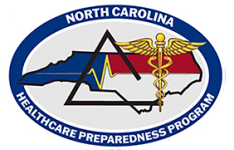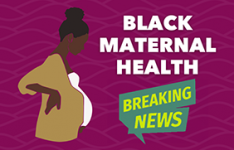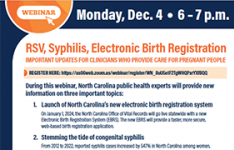News
Here's the recent news from PQCNC.
Western NC is in need of clinical support to provide labor and delivery services for pregnant individuals. If you are available and interested in being deployed to this area of the state to support pregnant and postpartum individuals, please take a moment to complete this survey. Any help would be greatly appreciated. North Carolina Hurricane Helene Staffing Support Read more...
PQCNC is pleased to welcome Caroline Hays (MPH, RN, BSN) to the PQCNC Core Team as our new Clinical Initiative Manager for Maternal Initiatives Read more...
Continuing cLOUDi: Meet Regional Perinatal Substance Use Disorder medical teamsWebinar - Thursday, November 7, 2024 12:00 - 1:00 PM - register here Read more...
Mark your calendars for October 28th at the McKimmon Center.Register here Read more...
PQCNC is proud to announce new PQCNC core team leadership for maternal projects. Over the years we have realized the commitment this position requires, as well as the leadership needed to seize opportunities that are provided to improve care and to change culture. With that in mind, we are pleased to welcome Rick Temple to the PQCNC Core Team as our new lead for Maternal Initiatives. Read more...
It's time for PQCNC to consider initiatives for launch in January of 2026.While we are all currently heavily engaged in Maternal Sepsis and Care of the Late Preterm Infant, your PQCNC Core Team is thinking ahead...like to 2026!!! As PQCNC veterans know it takes time to develop projects. We start by calling for projects 18 months prior to launch. Read more...
North Carolina has the most recognized hospitals, with six hospitals achieving excellent outcomes for cesarean section and unexpected newborn complications among Black patients.For Black Maternal Health Week 2024 U.S. News & World Report, the global authority in hospital rankings and consumer advice, today recognized High-Performing Maternity Care Hospitals’ success in supporting Black maternal health. Read more...








